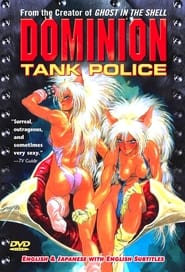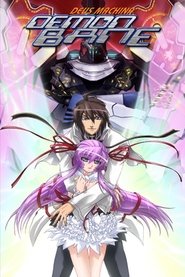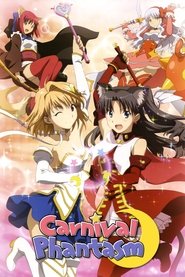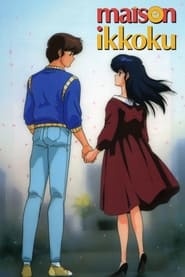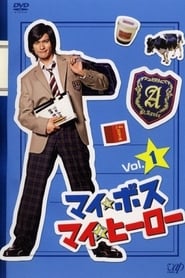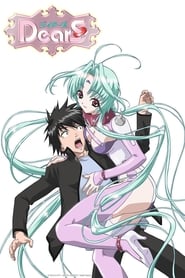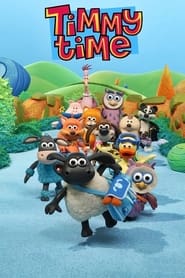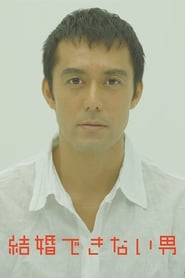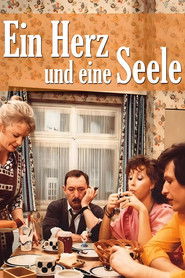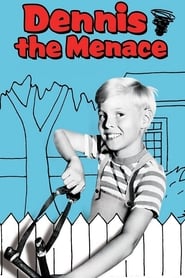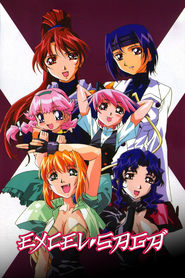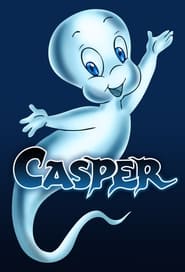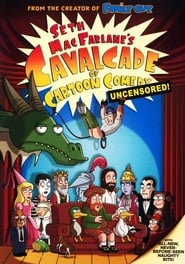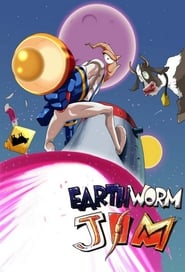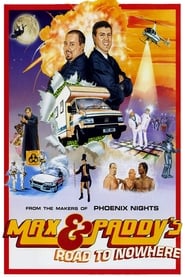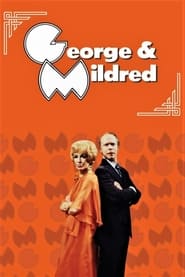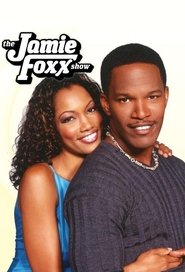Top Rated Comedy TV Series on Pantaflix - Page 157
-
Dominion Tank Police
1988
Dominion Tank Police
1988
star 6.9Leona Ozaki joins Newport City's infamous Tank Police division. With aid of Al and her newly built mini-tank, Bonaparte, she wages war on Buaku and his cohorts, the Puma Sisters. -
Demonbane
2006
Demonbane
2006
star 8.1Arkham City is being terrified by the dreadful crime organization called the Black Lodge. The War between Demonbane and Masterterion has just begun! -
Carnival Phantasm
2011
Carnival Phantasm
2011
star 8.5Comedy OVA series based on the Type-Moon Gag manga, Take-Moon. It focuses on funny and absurd situations happening to the various characters of the Type-Moon franchises, mostly from Fate/stay night and Tsukihime. -
Maison Ikkoku
1986
Maison Ikkoku
1986
star 7.6Godai is a ronin (someone who has failed university entrance exams) living in a run down apartment house called Maison Ikkoku. Among the other residents are the nosy Ichinose, the sexy Akemi Roppongi, and the mysterious Yotsuya. The others are given to having wild parties which makes it difficult for Godai to study. Into this mayhem comes the recently widowed Kyoko as the new live-in manager. Godai falls for her, but doesn't have the nerve to tell her. As time passes, their relationship slowly develops amid life at Maison Ikkoku, despite all sorts of romantic hurdles. -
Mermaid Melody: Pichi Pichi Pitch
2003
star 8.1As one of the seven mermaid princesses, Lucia must travel to the human world to protect the mermaid kingdoms. -
My Boss, My Hero
2006
My Boss, My Hero
2006
star 8Sakaki Makio, also known as "Tornado" is a tough 27-year-old high school drop-out. By academic standards, he's pretty dumb. His father decides to force Makio to return to high school to receive his diploma and he asks an old friend who happens to be the principal of a nearby school to admit Makio. If Makio doesn't graduate, the position of boss will be given to his younger brother, Mikio. Furthermore, he must pose as a 17-year-old during school hours and in the presence of any classmates or teachers outside of school. If his cover is blown, it would be the end of his high school career as well as his hopes to become boss. Things start out rough and tough as Makio's violent temper is tested. As the lessons and days go by he learns there is much more to school than just tests and studying. -
DearS
2004
DearS
2004
star 6.2One year ago, a UFO containing 150 aliens crash-landed off the shores of Kasai. Because no one could fix their ship, the Japanese Government decided to bestow upon them the designation "DearS" and make them into Japanese citizens. One morning, a truck carrying a capsule that housed one of the aliens ends up dropping it into the riverbank, releasing her from her confinement. She is eventually found by a high school student named Takeya Ikuhara, who saves her, despite being extremely distrustful of their race and wanting nothing to do with them. Upon being named Ren, she imprints upon him as her "Master" and serves as his personal "Slave," leaving him with a "DearS" who wants to remain with him no matter what. -
Timmy Time
2009
Timmy Time
2009
star 6.4Timmy is a little lamb which has just turned three (in sheep years) and is going to nursery! In this bright and colourful environment, Timmy and his animal chums learn how to make friends, create new things, paint, draw and generally learn those very important 'life lessons' from their nursery teachers, Harriet Heron and Osbourne Owl. -
He Who Can't Marry
2006
He Who Can't Marry
2006
star 8Kekkon dekinai otoko, known in English as He Who Can't Marry, is a 2006 Japanese drama broadcast by Fuji TV. The theme song is "Swimmy" by Every Little Thing. The drama was produced by Kansai Telecasting Corporation and Media Mix Japan. -
Cromartie High School
2003
star 6.8Folks, meet Takashi Kamiyama. Enrolled at Cromartie High, where everybody is a delinquent, Kamiyama is apparently the only non-delinquent in the school. Logically, therefore, he must be the toughest in his class—by the rather twisted logic that only a really tough rabbit would lie down with lions. Thus begins a story that parodies every cliché of tough-guy anime that you've ever heard of, and some you haven't. Oh, and Freddie Mercury is in it, too. -
Ein Herz und eine Seele
1973
star 8.7Ein Herz und eine Seele is a German cult sitcom based on the British sitcom Till Death Us Do Part by Johnny Speight. The show premiered on January 15, 1973 and lasted for about twenty episodes, airing its last on November 4, 1974. In 1976, the show had a short-lived revival with another four episodes. Ein Herz und eine Seele was written by Wolfgang Menge. The show was extremely successful during its initial run and it still proves very popular in reruns. Two episodes in particular, Silvesterpunsch and Rosenmontagszug have gained such popularity that they are now shown traditionally on German TV on New Year's Eve and Rosenmontag, respectively. -
Dennis the Menace
1959
Dennis the Menace
1959
star 6.5This 1959-1963 television situation comedy series follows the lives of the Mitchell family, Henry, Alice, and their only child Dennis, an energetic, trouble-prone, mischievous, but well-meaning boy, who often tangles with his peace-and-quiet-loving neighbor George Wilson, a retired salesman, or, later, with George's brother John, a writer. Dennis is basically a good, well-intentioned boy who always tries to help people, but who winds up making situations worse – often at Mr. Wilson's expense. -
Excel Saga
1999
Excel Saga
1999
star 7.8Hyperactive Excel does anything and everything to try to please her lord, Il Palazzo, who wants to take over the planet. Excel’s misadventures takes her and her partner, the ever-dying Hyatt, all over the world, meeting several strange people as they go. Everything is bizarre and goofy, as any kind of anime or entertainment genre gets mocked and spoofed. -
The Spooktacular New Adventures of Casper
1996
star 6.5Casper is a friendly ghost--the friendliest ghost you know! Unfortunately he lives with his three Hauntaholic uncles: Uncle Stretch, who's convinced he's smarter than anyone who ever died; Stinkie, who can put down any fleshie with one belch-blast; and Fatso, who's big, round and not too bright. Trying to cure these brothers is Dr. James Harvey and his spunky and worldly daughter Kat. Put them all under one roof and you have a house full of fun. -
Seth MacFarlane's Cavalcade of Cartoon Comedy
2008
star 5.8Seth MacFarlane's Cavalcade of Cartoon Comedy is an American cartoon web series created by Seth MacFarlane. The series is based on the cutaway jokes on Family Guy. -
Earthworm Jim
1995
Earthworm Jim
1995
star 7.2Jim was a multi-celled life form happily burrowing through the topsoil. His life changed in a flash when an extraterrestrial super-suit fell out of the sky. Instantly transformed from a 98 gram weakling into a muscular worm endowed with superpowers, extraordinary strength and the ability to leap incredible heights and distances, the suit renders him invulnerable. Earthworm Jim - daring defender of Earth, the cosmos and everything in between! -
Tom Goes to the Mayor
2004
star 6.8Tom Goes to the Mayor is an American animated television series created by Tim Heidecker and Eric Wareheim for Cartoon Network's late night programming block, Adult Swim. It premiered on November 14, 2004 and ended on September 25, 2006, with a total of thirty episodes. -
Max and Paddy's Road to Nowhere
2004
star 7.5Max And Paddy's Road To Nowhere is the much-loved sequel to Peter Kay's critically-acclaimed comedy series, "Phoenix Nights". Written by and starring Peter Kay and Patrick McGuinness, this six-part comedy/drama series is the story of clueless Phoenix Club bouncers Max (Kay) and Paddy (McGuinness), as they escape clubland in their prized motor-home and take to the open highway. -
George and Mildred
1976
George and Mildred
1976
star 6.8A middle-aged housewife feels frustrated with her mean and miserable husband, the married couple adapting to life in an up-market housing estate. -
The Jamie Foxx Show
1996
The Jamie Foxx Show
1996
star 6.9Texas native Jamie King is an aspiring actor who heads to Hollywood in hopes to find fame and fortune in the entertainment industry. To support himself, he works at his Aunt Helen and Uncle Junior's Los Angeles hotel, the King's Towers.
 Netflix
Netflix
 Amazon Prime Video
Amazon Prime Video
 Apple iTunes
Apple iTunes
 Apple TV Plus
Apple TV Plus
 Disney Plus
Disney Plus
 Google Play Movies
Google Play Movies
 Paramount Plus
Paramount Plus
 Hulu
Hulu
 HBO Max
HBO Max
 YouTube
YouTube
 fuboTV
fuboTV
 Peacock
Peacock
 Peacock Premium
Peacock Premium
 Amazon Video
Amazon Video
 The Roku Channel
The Roku Channel
 AMC+
AMC+
 Kocowa
Kocowa
 Hoopla
Hoopla
 The CW
The CW
 Vudu
Vudu
 Starz
Starz
 Showtime
Showtime
 PBS
PBS
 Pantaflix
Pantaflix
 FXNow
FXNow
 Tubi TV
Tubi TV
 Kanopy
Kanopy
 Comedy Central
Comedy Central
 Crunchyroll
Crunchyroll
 Microsoft Store
Microsoft Store
 Redbox
Redbox
 Sun Nxt
Sun Nxt
 ABC
ABC
 DIRECTV
DIRECTV
 Crackle
Crackle
 Fandor
Fandor
 Plex
Plex
